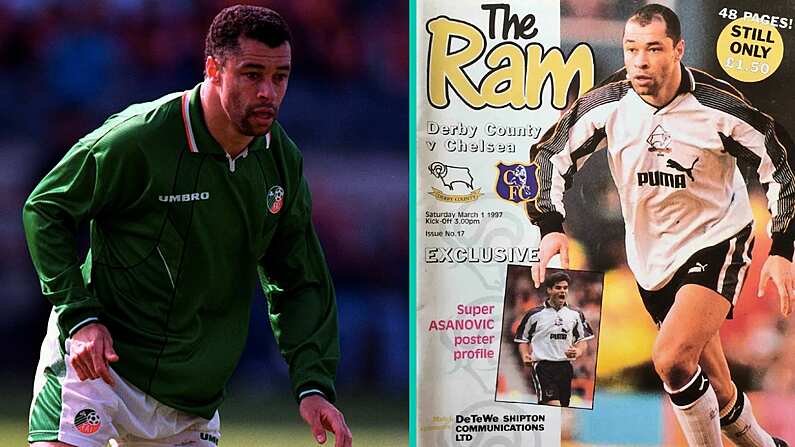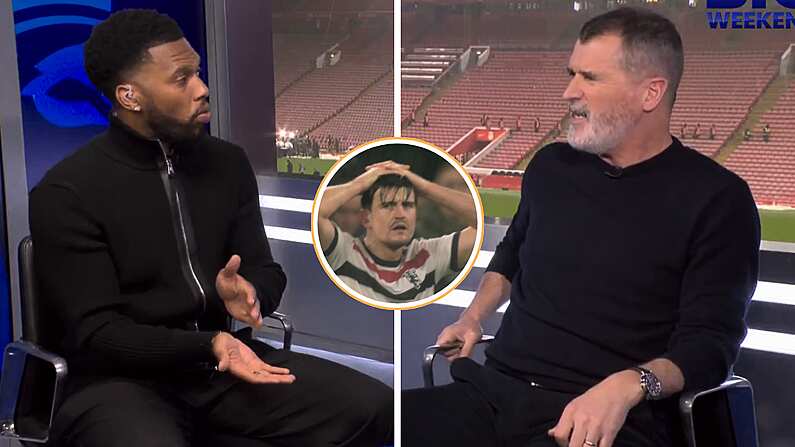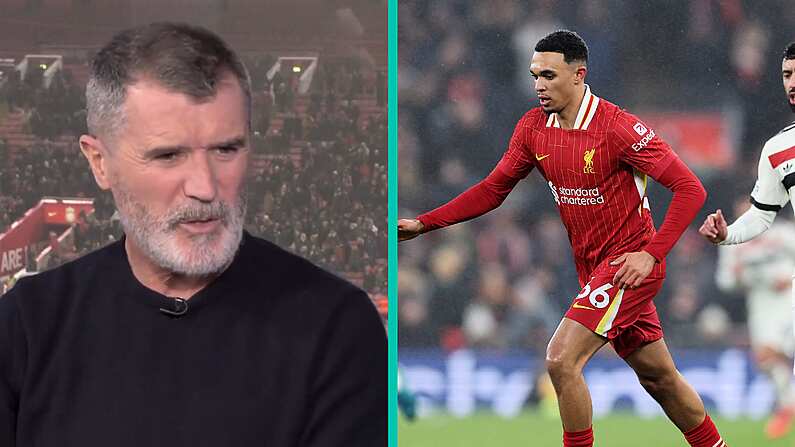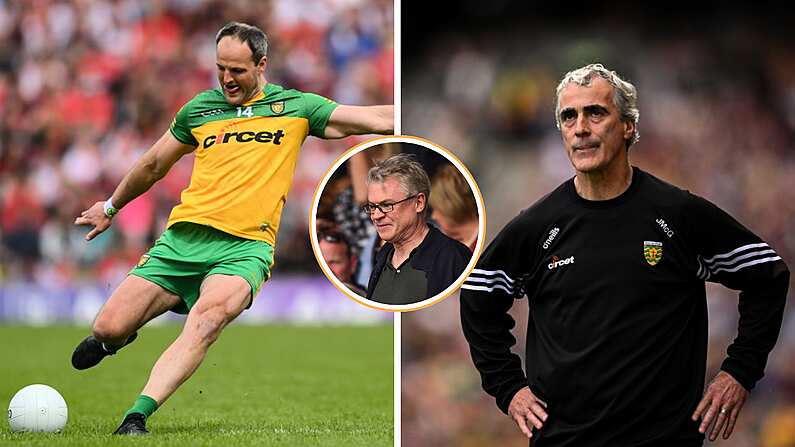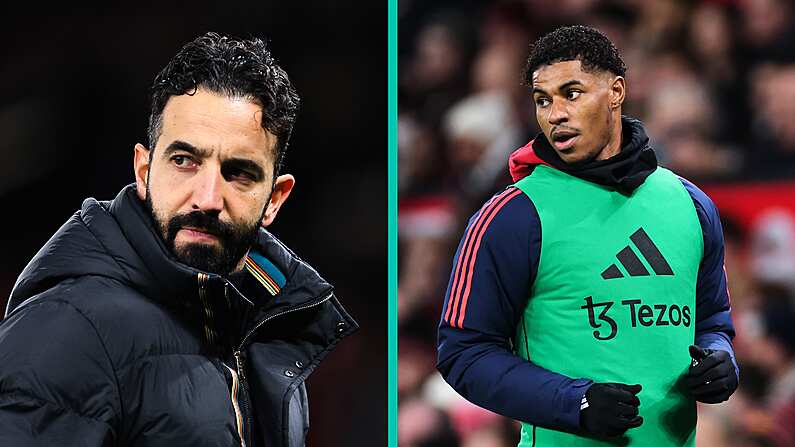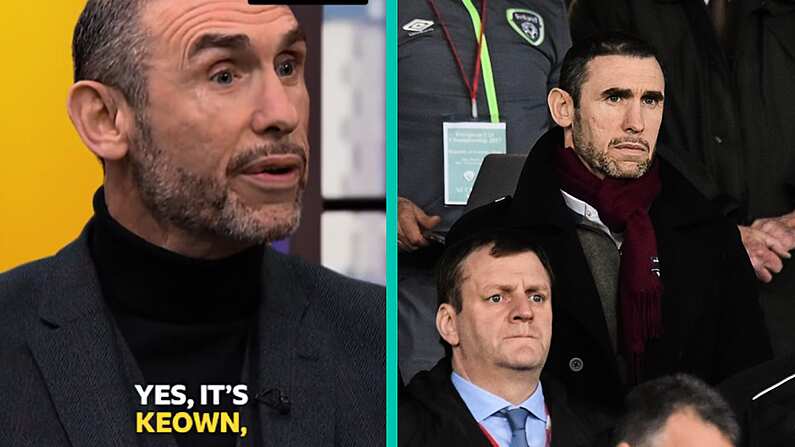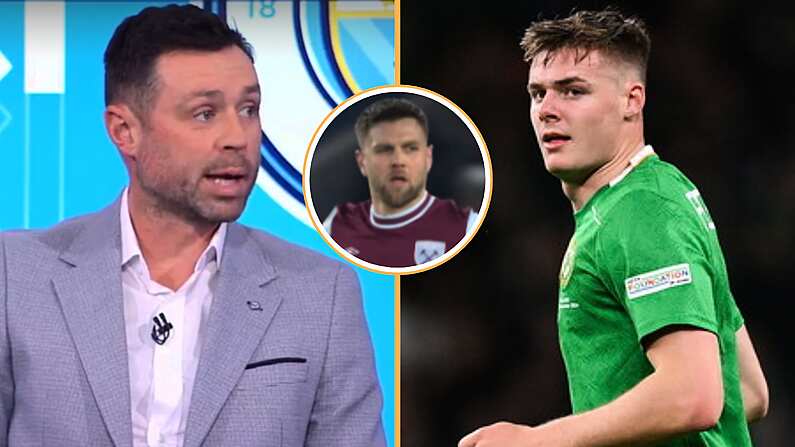Ask anyone about Paul McGrath's playing career and you'll likely hear the same two clubs mentioned.
Football fans of just about any age in Ireland will know of his heroics at Aston Villa, claiming the PFA Player of the Year award in the first season of the Premier League in 1992-93. And, before that, he was an FA Cup winner during a seven-year spell at Manchester United.
If you were to mention Paul McGrath and Derby County together, however, you might find a few confused faces.
However, in the twilight of his career, McGrath had one final Premier League masterpiece left in him. His campaign with Derby that year is one that would be hard to fathom coming true in this day and age.
READ HERE: Nostalgia Alert: Photos From Paul McGrath's Testimonial In 1998
Ex-Derby coach looks back on his time working with Paul McGrath
In his autobiography, Paul McGrath states how grateful he was to Derby manager Jim Smith for bringing him onboard for the 1996-97 season, after his somewhat unexpected exit from Aston Villa after seven years.
Steve Round was an assistant coach to Smith at Derby County that season, having retired as a player at the club two seasons prior due to injury. He waxes lyrical about Paul McGrath's ability on the ball but, speaking to Balls.ie, he admits he did not have much engagement with McGrath on the training pitch.
What was interesting was that I don’t ever recall coaching him in a session. I don’t think he ever trained while he was there. I could be wrong but all I can remember him doing is coming out and walking around the pitch with the physio Gordon Guthrie.
He would watch the session, he would take onboard what the coaches were trying to do in terms of the team’s preparation for who we were playing against, and he would walk around the pitch. That was his training session.
He was clued in, he knew exactly what was going in, experienced guy, he’d know we were playing a back-four this week or a back-five this week.
But he didn’t train, he just looked after his knees and rested. I remember him doing a little bit of work in the gym and that. But it’s amazing he was then able to go and perform at that level without even training.
It’s unheard of today but he could do it.
The concept is crazy. Trying to wrap your head around going out on a Saturday and bossing it in the Premier League having not set foot on the training pitch all week will not compute with the majority of football fans.
But that is what Paul McGrath did during Derby's surprisingly brilliant 96-97 campaign.
The Rams had been promoted from the Championship the previous May, but they were lacking in Premier League experience. 36-year-old McGrath arrived to hold firm in the Derby backline.
"I think Jim felt that the most important thing that season was to stay in the league first and foremost and then build from there," Round explains. "So we needed some experience to help a lot of the younger players and give us some solidity. That was probably the reason why he signed Paul McGrath.
"He had vast experience of the Premier League, had played at the highest level, top, top defender. Strong man, strong-willed, a sort of quiet leader. He led by example and led by the standards that he set in his football performances. I think that was a critical signing."
McGrath played in 24 Premier League games that season, despite his body beginning to turn on him towards the end of his playing days. Despite his absence from many of Derby's training sessions, Round tells us that the Derby squad could do nothing but look up to the titan among their ranks.
Even more important than that is the trust of the team. The team could easily turn around and go, ‘Well, if he’s not training, then I’m not training,’ or ‘Why is he not training? Why do I have to train? Why are we selecting him when he hasn’t trained all week?’
If you look and it’s Paul McGrath and he’s putting in the performances he was putting in, his seniority, where he’d played, what he’d achieved in his career.
I’ve never, ever recalled any murmur of dissension from the players at all. They just respected that this guy would do the business on the Saturday.
A combative presence whether he played at the back or in midfield throughout his career, McGrath was also clever in how he managed his injury-ridden body towards the end of his career.
Round explains how he subtly changed his technique in attacking the ball in order to play to his strengths during his year with Derby.
One of the things that used to amaze me, which he had adapted to...he was playing left-side centre back. If he was running back towards his own goal and they were attacking down our left, their right, what you tell defenders is to turn very quickly so the goalkeeper can see your number. So, when the cross comes in, you're set, your shoulders are set, and you can see where the forwards are. You can see your own defenders, your body position is in the right place to attack.
Because of his body, his knees at the time, he couldn't do that turn quickly enough to get into a set position. So, he would run back towards his own goal, and the cross would come in, and he would backheel the clearance with his right foot because he was facing his own goal. He'd backheel it and it would go 40 or 50 yards. It was unbelievable! His timing to be able to do it...how did you do that?!
It was incredible how he had adapted to make sure he was still performing at that level.
Paul McGrath's campaign at Derby would ultimately prove to be the last he would play in England's top flight, but he played a pivotal role in keeping the club in the Premier League.
In fact, Derby would manage a superb 12th place finish in their first top flight campaign in six years. There were many memorable moments along the way but the one that stood out for neutral fans was the shock 3-2 win at Old Trafford. Defending champions, Manchester United would go on to win the title again, but they were no match for Paulo Wanchope's wonder goal.
Wanchope's goal is fondly remembered in Premier League folklore but Steve Round attests that that game was also the finest hour of Paul McGrath's spell with Derby.
Against his former club - from whom he had endured a tough exit - McGrath was immense in defence, in a performance that summed up his and Derby's resolve.
Beneath Paul McGrath's playing career, there were of course the demons of his private life, and his struggles with alcoholism and depression. Round says that he and the coaching staff were aware of these issues but that Jim Smith was kind to the Irishman, allowing him time to visit family back home and taking care of him during darker moments.
I was less aware of that human side than I am now...but there was always an underlying sort of thought that he could go off and have a drink or do something. But this is where I think Jim's skill was exceptional because he understood what Paul needed and what help he needed and what support he needed for himself and to play well in the team.
There were times when Jim would say to us, 'I've given him three days off, he's gone back to Ireland, he's going to see people that he needs to see. But don't worry, he'll be here to walk around the pitch on Thursday, walk around the pitch on Friday and he'll play on Saturday and we'll get a clean sheet and we'll win.
Perhaps the most endearing observation is on McGrath's leadership qualities. He did not lead by barrelling shouts or rallying cries - he led by example.
"There was a mark of respect," Round says, "He had that big smile that he could put out there, which was quite warming for everybody."
Steve Round would spend five years with Derby before departing in 2001, and his career has seen him work at some of England's biggest clubs and with the best defenders in the game. Most recently, he worked with Arsenal's impressive duo of Gabriel and William Saliba, departing his role only last year. He has also coached with England and Manchester United - but he says McGrath remains among the very best defenders he encountered across his entire career.
He'd be a top player today, I have no doubt. In his early 20s, mid 20s, he was so quick, so strong, aggressive, and he could play football - he could pass, he could bring the ball out.
He'd have no problem playing in the top flight today, at the very top, in a top team. I've no doubt about that. He could walk into any of the top four or five teams now, no problem.
Like I say, I didn't really coach him because he never trained! But watching him, he's one of the best defenders...if you say, 'Top 10 defenders of the last 30 years that I've worked with,' he's in that. He could be in the top three or four. The likes of John Terry and Rio Ferdinand I've worked with, he's up there with those guys.
Paul McGrath would go on to spent half a season in the Championship with Sheffield United, before retiring the following winter just before his 38th birthday. 65 this Wednesday, he may well be best remembered for his exploits at Old Trafford and Villa Park, but any of the Derby faithful who packed out the Baseball Ground in the mid-1990s will have a special place in their heart for McGrath too.

